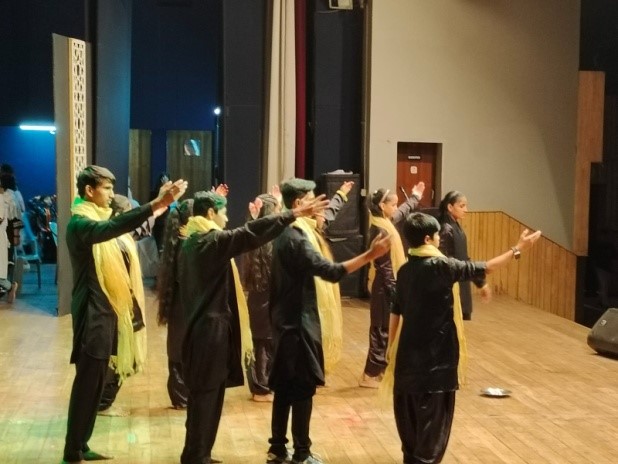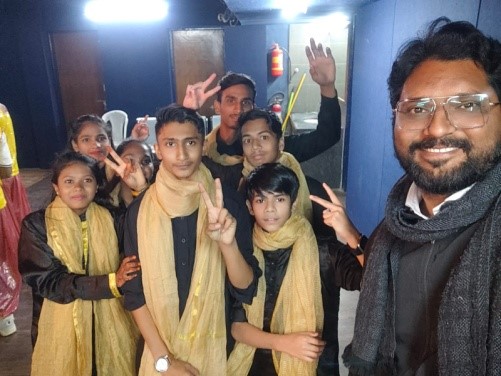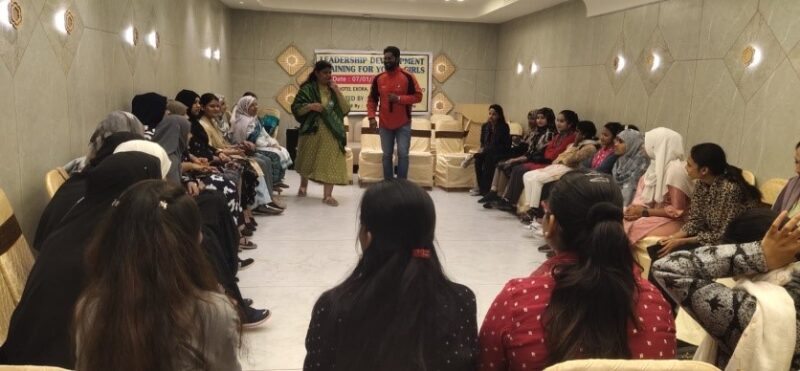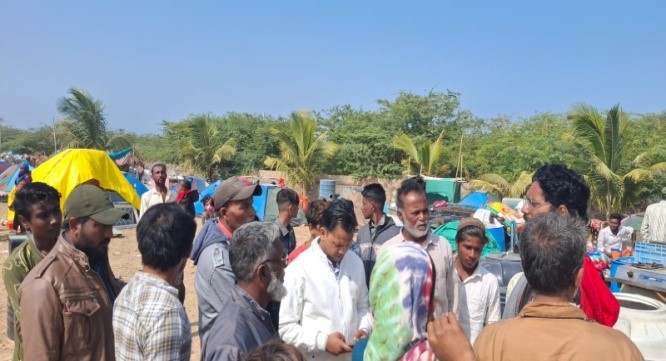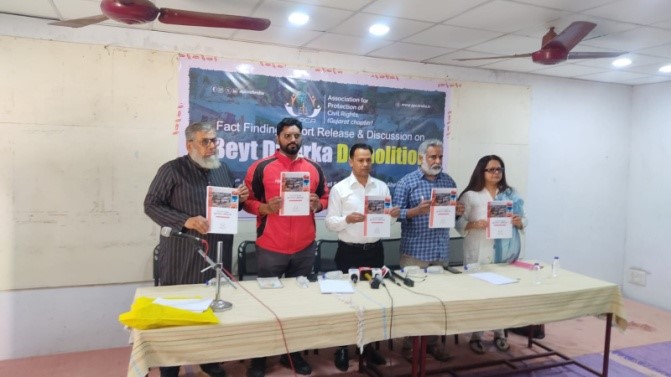Skit on Communal Harmony
As part of our ongoing engagement with teachers and students of Apollo School, we continued our efforts to promote communal harmony through creative expression. This year, as per our plan, it was decided to stage a 15-minute play during the school’s annual function. Given the current socio-cultural context, the theme of the skit was centered on communal harmony, aiming to spread awareness and develop unity among students and the larger community.
To initiate the process, a one-day workshop was organized with students and teachers to discuss issues related to communal harmony on December 31st. This interactive session helped develop a understanding of prevailing communal tensions and the importance of co-existence. The workshop, held for students from grades 10 to 12, witnessed the participation of 20 students and 10 teachers. Through discussions, role-playing, and storytelling, participants explored the significance of tolerance, peace, and mutual respect in a diverse society.
Following the workshop, the process of developing the skit commenced on January 2nd and continued until January 12th. A group of 15 dedicated students actively participated in scriptwriting, rehearsals, and in production. The storyline of the skit was designed to convey a powerful message of humanism, emphasizing the lost values of empathy and co-existence. It highlighted the importance of reviving a culture of tolerance, acceptance, and unity amidst diversity. The integration of music and expressive performances added depth to the narrative, making it more engaging and impactful.
On January 13th, the skit was performed during the school’s annual function in front of an audience of over 500 parents, teachers, and students. The performance was met with overwhelming appreciation, as it effectively conveyed the essence of communal harmony and peaceful co-existence. Many in the audience expressed their admiration for the students’ dedication and the clarity of the message portrayed through the skit.
Beyond the performance itself, the process proved to be a transformative experience for the students involved. Through their participation, they not only enhanced their theatrical skills but also deepened their understanding of communal issues. This initiative extended beyond the school, as the students carried the message of harmony into their communities, developing conversations about peace and unity at a grassroots level.
Facilitating Training Workshops with Young Girls and Community Women Leaders
Parwaaz organized two distinct training workshops aimed at empowering young girls and community women leaders. These day-long sessions were facilitated by Hozefa Ujjaini and provided an opportunity for participants to develop leadership skills and gain a deeper understanding of social issues.
The first training session took place on January 7, 2025, in Paldi, Ahmedabad, with the participation of 35 young girls. The primary objective of this workshop was to enhance leadership skills among them, enabling them to contribute positively to society. Through a series of interactive games and activities, the participants explored different types of leadership, understanding its various dimensions beyond the commonly recognized political and religious leadership. The workshop emphasized the often-overlooked aspects of social and reformist leadership, highlighting its significance in driving positive change. The session also facilitated discussions on fundamental leadership qualities that individual’s carries from childhood, helping participants reflect on their own potential and aspirations.
The second training session, focused on community women leaders, was conducted on January 22, 2025, at Paldi, Ahmedabad. More than 35 women leaders participated in the workshop. This workshop was facilitated by researcher and academician Tasnim Bharmal, along with Hozefa Ujjaini. Tasnim Bharmal led an in-depth session on the increasing threats and violence against women in online spaces. She explained how social media platforms operate, the algorithms that govern their content distribution, and how these systems contribute to the objectification and harassment of women. Her discussion shed light on the language and narratives used against women on digital platforms, helping participants understand the structural challenges they face in the virtual world.
Following this session, Hozefa Ujjaini elaborated on the concept of leadership, its various forms, and the essential skills required to take on leadership roles. He emphasized the importance of value-based leadership, encouraging participants to cultivate and practice ethical leadership principles in their personal and professional lives. The discussion also delved into the process of assuming leadership roles and the practical application of leadership skills in grassroots community work.
Beyt Dwarka Fact Finding – 17th to 19th January 2025
According to media reports, a large-scale demolition drive was carried out in the Bet Dwarka region of Devbhoomi Dwarka from January 11, 2025, to January 18, 2025. This drive was conducted in three phases across different areas. Reports indicate that a total of 525 structures were demolished, clearing 127,917 square meters of land. As per government valuation (Jantri), the estimated worth of this land is approximately INR 73.53 crore. Religious sites were also included in this demolition drive. Around 1,000 police personnel, including SRP (State Reserve Police) and the Marine Task Force, were deployed for the operation.
Media reports claimed that all these structures were illegal encroachments and were removed for security reasons. In this context, the state’s Home Minister, Harsh Sanghavi, wrote on the social media platform X, “Beyt Dwarka is the land of faith for millions of people across the country. We will not allow any illegal encroachment on Krishna’s land. It is our responsibility to protect our faith and culture.” During the demolition, messages such as “Dada nu bulldozer (Dada’s bulldozer) has rolled over encroached land in Devbhoomi Dwarka” went viral on local news channels and social media. Moreover, entry and exit from the area were completely restricted during the demolition. For security reasons, the Signature Bridge (Sudarshan Setu) was also closed to travelers. However, the voices and perspectives of the affected local residents were not reflected in any media reports.
Against the backdrop of these reports and events, a team from Ahmedabad visited Bet Dwarka on January 18, 2025, to investigate the matter and uncover the reality of the situation. Notably, on the 18th, while the team was surveying these areas, “Malad Shah Pir Dargah” in Rupen Bandar was being demolished, and the police had cordoned off surrounding Muslim localities.
The fact-finding team included Advocate Shamshad Pathan, Gujarat President of the “Association for Protection of Civil Rights (APCR)”, APCR General Secretary “Ikram Mirza”, “Altaf Bhai Sheikh” from the “Society for Bright Future (SBF)”, and “Hozefa Ujjaini”, a member of the “People’s Union for Civil Liberties (PUCL), Ahmedabad, Gujarat”. This team visited the affected areas, including “Bhimsar, Balapar, Par, and Okha” in Bet Dwarka.
Major Findings of the Team:
- All the demolished houses belonged to Machhimar Muslims, except for 17 houses belonging to Hindus. While the land was government-owned, the residents were not encroachers, as they had been living there for more than 50 years. There was a lack of consistency in issuing demolition notices. While some people received notices in advance, others were either not given any notice or were handed notices on the spot before their houses were demolished.
- The police played an intimidating role, acting against the interests of the people rather than ensuring their protection.
- The government has completely abandoned its role as a welfare state, instead displaying authoritarian tendencies at their worst.
- 52 houses built under the Indira Awas Yojana were also demolished as part of this drive.
- The media played a biased role, amplifying the government’s narrative rather than providing neutral and balanced reporting. Except for BBC and a few independent YouTube channels, no major media outlets covered the voices of the affected local residents.
Few more findings:
Understanding the victim’s perspective makes it evident that the state government, instead of fulfilling its welfare role, is adopting an oppressive approach by depriving its citizens of their fundamental rights. The government is projecting itself as the protector of the majority community’s culture, while simultaneously fueling hatred and alienation against the Muslim community. This situation highlights a departure from the fundamental principles of a secular state, revealing the state’s shift towards religious nationalism. Moreover, it directly attacks shared cultural heritage and the idea of coexistence.
In the agenda of development, the constitutional rights of the people, particularly Article 21, which guarantees the right to life and personal liberty, appear to be violated. The right to housing, which is considered an integral part of Article 21, is being directly violated in a blatant manner.
The demolition process was unconstitutional and illegal, violating Supreme Court guidelines. Copies of notices, newspaper reports, and conversations with local residents clearly indicate that the entire demolition process was carried out in disregard of legal and constitutional provisions.
Violation of Rights:
During the demolition, there was a direct violation of:
- Children’s rights, women’s rights, and the fundamental right to housing.
- Article 3 of the Universal Declaration of Human Rights (UDHR), which guarantees every person the right to life, liberty, and personal security.
- The right to housing, which is protected under Article 21 of the Indian Constitution (Right to Life and Personal Liberty), was completely ignored in this action.
Major Demands of the Committee:
- The displaced fishermen (Muslim) and Waghar (Hindu) communities should be rehabilitated within Bet Dwarka by providing them land. Until the rehabilitation process is completed, they should receive monthly cash assistance (cash dole). Additionally, relief camps should be set up to provide shelter, food, and healthcare facilities for all affected families.
- Considering the education of children, immediate arrangements should be made to ensure uninterrupted schooling for them.
- Since the demolition has severely impacted the fishing business of the fishermen and the wage-based livelihood of the Waghar community, the government should provide them appropriate compensation for their loss of employment. Additionally, they should be given permanent housing in Bet Dwarka to help them restart their businesses.
- A transparent plan should be developed in consultation with the fishing community, addressing their rehabilitation, employment, and education-related concerns.
- As this entire area falls under the Coastal Regulation Zone (CRZ), the Gujarat Coastal Zone Management Authority (GCZMA) and the relevant local offices should ensure that the fishing business is not disrupted and take effective action for their rehabilitation.
- The 52 families whose houses were demolished under the Indira Awas Yojana should be immediately provided plots by the government, and new houses should be constructed for them.
Press Conference – 27th January 2025
A press conference was organized by the Association for Protection of Civil Rights (APCR) on 27th January 2025, at Sardar Hall, Laldarwaja, to present the findings of a recent fact-finding of Beyt Dwarka demolition. The conference was attended by representatives from both local and print media. Key speakers at the conference included National Secretary PUCL, Prasad Chacko, President APCR, Advocate Shamshad Pathan, PUCL representative Advocate, Hozefa Ujjaini, Social Activist Sheeba George, and APCR Secretary, Ikram Mirza. During the conference, the findings of the report were shared with the media, highlighting the facts surrounding the incidents investigated. The speakers also discussed the broader impact of such demolition drive on communities, including the cultural, political, social and economic disruptions they cause. In total, representatives from around 15 media outlets attended, along with 40 social activists and concerned citizens. The discussions during the event emphasized the need to expose the face of government which is discriminative and biased.
Media Coverage Links:
- IndiaTomorrow:
- Radiance News:
- net
https://clarionindia.net/gujarats-bet-dwarka-demolition-drive-mainly-targeted-muslims-rights-group/
- Vibes of India
Participation:
- The Movement for Secular Democracy organizes a weekly talk every Thursday on various issues. On 30th January 2025, they held a discussion on the Beyt Dwarka demolition drive fact-finding report. Hozefa Ujjaini was invited to speak on the findings, and he presented the entire report in detail. The talk was conducted online, and the YouTube link is attached here: https://www.youtube.com/watch?v=bLF_HziCemk. The Facebook live stream of the event has reached 2K views.
- On 18th January 2025, a meeting organized by Parwaaz with women leaders in Juhapura. The primary objective of the meeting was to enhance participants’ understanding of Section 125 of the Code of Criminal Procedure (CrPC) and its relevance to Muslim women’s rights, particularly in light of a recent Supreme Court judgment affirming their right to receive maintenance under this section in the case of Mohd. Abdul Samad Vs. The State of Telengana & Anr. The meeting was facilitated by HozefaUjjaini and Khairunnisha Pathan.
- On 19th January 2025, Samarpan organized a training session at Punaruththan, Majur Gaam, Ahmedabad. The workshop aimed to develop an understanding of the Right to Information (RTI) Act. Advocate Mukesh and Hozefa facilitated the session, explaining the key aspects of the RTI Act to the participants. They also assigned a practical task, requiring participants to draft their first RTI application on issues relevant to them. Approximately 25 people participated in the training.

